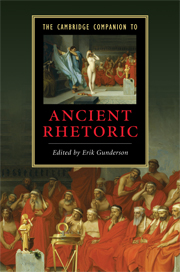Book contents
- Frontmatter
- Introduction
- Part 1 An archaeology of rhetoric
- Part II The field of language
- Part III The practice of rhetoric
- 8 Types of oratory
- 9 Rhetoric of the Athenian citizen
- 10 Rhetoric and the Roman Republic
- 11 Staging rhetoric in Athens
- 12 The drama of rhetoric at Rome
- 13 Rhetoric and the Second Sophistic
- Part IV Epilogoues
- Appendix 1: Rhetorical terms
- Appendix 2: Authors and prominent individuals
- References
- Index of passages
- Index of subjects
- Series list
9 - Rhetoric of the Athenian citizen
from Part III - The practice of rhetoric
Published online by Cambridge University Press: 28 January 2010
- Frontmatter
- Introduction
- Part 1 An archaeology of rhetoric
- Part II The field of language
- Part III The practice of rhetoric
- 8 Types of oratory
- 9 Rhetoric of the Athenian citizen
- 10 Rhetoric and the Roman Republic
- 11 Staging rhetoric in Athens
- 12 The drama of rhetoric at Rome
- 13 Rhetoric and the Second Sophistic
- Part IV Epilogoues
- Appendix 1: Rhetorical terms
- Appendix 2: Authors and prominent individuals
- References
- Index of passages
- Index of subjects
- Series list
Summary
Synonymy, metonymy, metaphor are not forms of thought that add a second sense to aprimary, constitutive literality of social relations; instead, they are partof the primary terrain itself in whcih the social is constituted.
(Laclau and Mouffe 1985:110)Rhetoric fueled Athenian democracy. Public policy was forged through persuasive speeches, and political power was the prize of oratorical skill. Citizenship, too, was defined by speech, the citizen’s right to speak his mind freely in the Assembly. But rhetoric also structured the democracy and the democratic citizen in more profound ways. If, as Jacques Lacan says, the unconscious is structured like a language, so too is the political unconscious, ideology. The ways in which citizens talk about themselves and their relationship to the city - the language they use but also the very grammar of their thought – is a vital part of that ideology. The rhetoric of the polites (citizen) bespeaks the fundamental structure, the constitutive tensions and aspirations, of the politeia (state).
In Athens the citizen was defined by rhetoric in a very literal sense. One of the key identifying attributes of a citizen was parrhēsia, the right to speak freely in the public sphere. This included the right of any citizen to stand up in the Assembly and argue for or against specific proposals, a freedom dramatized in Aristophanes’ Acharnians, where the everyman hero Dikaiopolis (“Just City”) attempts to convince his angry countrymen to make peace with Sparta. Frank speech, Aristophanes suggests, is not only the citizen’s right but his duty, his contribution to civic justice.
- Type
- Chapter
- Information
- The Cambridge Companion to Ancient Rhetoric , pp. 162 - 177Publisher: Cambridge University PressPrint publication year: 2009
- 3
- Cited by

